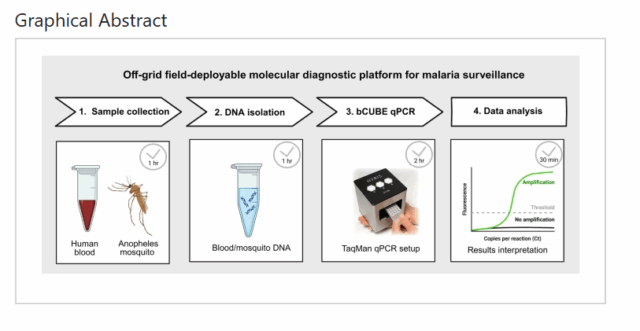
This study presents the development and validation of a portable, cost-effective, field-deployable real-time Polymerase Chain Reaction (qPCR) platform for detecting Plasmodium species. This field-friendly molecular diagnostic tool is called the bCUBE qPCR system. It is an innovative device capable of detecting malaria parasites in both human blood and mosquitoes with high accuracy, even at very low levels (as few as 0.5 parasites per microlitre of blood or just 5–10 sporozoites in mosquito samples). It also distinguishes between different malaria-causing Plasmodium species. Field tests in Cameroon confirmed its reliability, providing same-day results without the need for a centralized lab.
To achieve this feat, a two-step Deoxyribonucleic acid (DNA) isolation was performed to detect five Plasmodium species: Plasmodium Falciparum (P.f), Plasmodium vivax, Plasmodium malariae, Plasmodium ovale, and Plasmodium knowlesi; using the bCUBE qPCR platform. In vitro-cultured P.f and experimentally infected Anopheles gambiae were used to quantify P. falciparum infections, with infection prevalence compared to microscopy. The bCUBE qPCR system was also evaluated under field conditions to detect P. f infections in field-collected Anopheles gambiae mosquitoes.
The bCUBE qPCR demonstrated a strong linear correlation with a standard laboratory qPCR machine for detecting P.f infections. It successfully detected as few as 0.5 parasites/µl of blood, one oocyst (a single infection unit) in mosquito guts, and 5–10 sporozoites in salivary glands. It was also capable of discriminating between different Plasmodium species. The capability of the bCUBE qPCR system to detect infections in both individual and pooled mosquito surveillance further highlights its potential for in-field large-scale malaria monitoring surveillance
This tool is important in that it enables quick detection in remote areas, helping health workers act sooner. In addition, it is more affordable than standard lab equipment and reduces transport costs for samples. Given that it works for both individual and pooled mosquito testing, it makes large-scale surveillance easier. As a reminder, CRID acquired the bCUBE as part of a project it is carrying out in collaboration with the JohnsHopkins University (JHU) and HYRIS. Read more: https://doi.org/10.1186/s13071-025-06779-y






